

The Living Room Candidate. 70 maps that explain America. By Max Fisher and Dylan Matthews on July 1, 2015 The United States of America is many things.
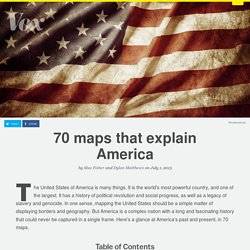
It is the world's most powerful country, and one of the largest. It has a history of political revolution and social progress, as well as a legacy of slavery and genocide. In one sense, mapping the United States should be a simple matter of displaying borders and geography. But America is a complex nation with a long and fascinating history that could never be captured in a single frame. 70 maps that explain America. Lynchings by states and counties in the United States, 1900-1931 : (data from Research Department, Tuskegee Institute) ; cleartype county outline map of the United States. The maps in the Map Collections materials were either published prior to 1922, produced by the United States government, or both (see catalogue records that accompany each map for information regarding date of publication and source).
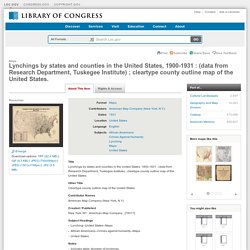
The Library of Congress is providing access to these materials for educational and research purposes and is not aware of any U.S. copyright protection (see Title 17 of the United States Code) or any other restrictions in the Map Collection materials. Note that the written permission of the copyright owners and/or other rights holders (such as publicity and/or privacy rights) is required for distribution, reproduction, or other use of protected items beyond that allowed by fair use or other statutory exemptions.
Responsibility for making an independent legal assessment of an item and securing any necessary permissions ultimately rests with persons desiring to use the item. Credit Line: Library of Congress, Geography and Map Division. How America became the most powerful country on Earth, in 11 maps. By Max Fisher on May 20, 2015 We take it for granted that the United States is the most powerful country on Earth today, and perhaps in human history.

The story of how that came to be is long, fascinating, complex — and often misunderstood. Scopes Trial - Day 7 - UMKC School of Law. "Read Your Bible" banner removed from courthouse Darrow--Your honor, before you send for the jury, I think it my duty to make this motion.
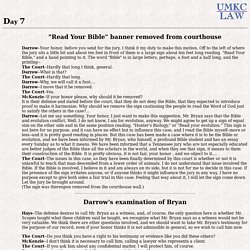
Off to the left of where the jury sits a little bit and about ten feet in front of them is a large sign about ten feet long reading. "Read Your Bible," and a hand pointing to it. The word "Bible" is in large letters, perhaps, a foot and a half long, and the printing-- The Court--Hardly that long I think, general. Darrow--What is that? Beyond the Bubble. Founders' Constitution. Gerrymandering Explained. The Progressive Presidents - AP U.S. History Topic Outlines. Roosevelt’s Square Deal At the dawn of the twentieth century, America was at a crossroads.
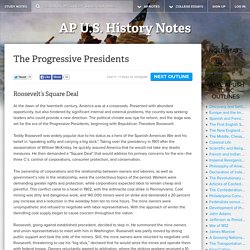
Presented with abundant opportunity, but also hindered by significant internal and external problems, the country was seeking leaders who could provide a new direction. Makers: Women Who Make America. Apr 25, 2014 Updated: 5:30 PM Get free updates |About WGBH Forgot password News Food & Wine Home & Travel Classical Music Arts Kids Science History Makers: Women Who Make America.

United States Elections Project. Last Updated: 3/25/2013 Please see the FAQ for information on the construction of these statistics.
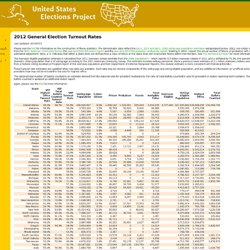
The demoninator data reflect the July 1, 2010 and July 1, 2011 voting-age population estimates extrapolated to Nov. 2012, non-citizen estimates from the 2011 American Community Survey , the year-end 2010 DOJ prison report and the year-end 2010 DOJ probation and parole report . Starting in 2010, I report the actual number of felons on probation with no estimated adjustment. Note, a '0' indicates that either a state does not disfranchise a class of felons or the state does not incarcerate felons within their borders.
Capitalism A Love Story 1. Election maps. Email: Thanks to everyone who wrote in about the maps.
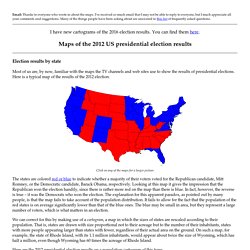
I've received so much email that I may not be able to reply to everyone, but I much appreciate all your comments and suggestions. Many of the things people have been asking about are answered in this list of frequently asked questions. I have new cartograms of the 2016 election results. You can find them here. Timeline: The Long History of Voter Suppression. Primary Source Documents. For this entry, the previous subject matter was "Original Dictionaries of the 16th & 17th Centuries" and was linked to excellent work done at the University of Toronto. Time has marched on, links disappear. The works have matured and expanded.
Our original list was--; American Revolution: Boston Tea Party - Eyewitness Account. Coming of the American Revolution: First Continental Congress. News of the Coercive Acts arrives in the colonies in the spring of 1774.

In response to the punitive measures outlined in the Boston Port Bill, Bostonians propose to cease all trade with Britain, as set forth in the Solemn League and Covenant. Haunted by the failure of earlier commercial resistance initiatives, the other twelve colonies (as well as most towns in Massachusetts) are wary of yielding to Boston's leadership. A colony-wide congress to discuss a united course of resistance emerges as a logical alternative. Slave Code of South Carolina. Editorial Introduction: Viewed through the looking glass of contemporary law as reflected in free and democratic societies, the 1740 Slave Code of South Carolina is most certainly an abomination.

It is a stain upon British and American legal history - South Carolina was a subject Province (aka colony) of "Her Majesty" in 1740. But then, few if any countries have perfect historical records regards to slavery. This law reflected the reality that pursuant to property law as then in vogue, negro slaves were the chattel of their owners to do with as they liked; really, except for speech, no different from a pig or a horse. This code of law is striking in its horrific detail which confirms the pathetic status of fellow human beings, the slave. The Slave Code was quickly passed and became known as the Negro Act. South Carolina's Negro Act certainly went a step further. History - Colonial Authority. Black slaves were prohibited from carrying firearms by a 1639 Virginia law, which prescribed 20 lashes for violations of the statute. There was one exception: with his master’s permission, a slave could bear firearms to defend against Indian raids.
Massachusetts became the first colony to legalize slavery in 1641. In 1650, Connecticut legalized slavery. The Barbados slave code was set up by the English in order to provide a legal base for slavery in the Caribbean island. Under its provisions, slave owners were required to provide clothing for their slaves; but the slaves were denied even the basic rights guaranteed by English common law. History News Network. Mr. America’s never-ending war against the world — 1900-1985. All the Previous Declarations of War - Garance Franke-Ruta. Congress has formally declared war only 11 times in U.S. history, and authorized the use of military force 11 times. As we head into a period of vigorous congressional debate over whether to authorize the use of force against Syria, it's instructive to look back at America's history of congressional war declarations.
Industrial Revolution. The History Lab: US History Essential Questions. CPI and 19th Century Working Class Income.
Jacksonian America. Civil War. Imperialism. WWI. WWII. Robber Barons. Great Depression. Cold War. Civil Rights Mvmnt. 9/11 Resources. History Lab Links Page. Documents Relating to American Foreign Policy, 1898-1914. Documents in Law, History and Diplomacy. Documents Relating to American Foreign Policy Prior to 1898. Documents Relating to American Foreign Policy Pre-1898 Pre-1776 The Mayflower Compact, 1620 John Winthrop, "City on a Hill," 1630. AAEC - Association of American Editorial Cartoonists. AP US History. The Power of Oratory in the US. Bryan's "Cross of Gold" Speech: Mesmerizing the Masses. War Speeches. Encyclopædia Britannica's Guide to Women's History. For millennia, women have left their mark on the world, at times changing the course of history and at other times influencing small but significant spheres of life.
Only in the past century, however, have concerted efforts been made to represent women's contributions more fully in history books. Consequently, changes in status for many women in modern times—the right to own property, to vote, and to choose their own careers—may obscure the accomplishments made by women of earlier eras. In selecting 300 influential women, Encyclopædia Britannica has included both contemporary women who are changing today's world and those whose contributions have endured through the ages. Child Labor in America: Investigative Photos of Lewis Hine.
About these Photos. How The USA Expanded (In One Mesmerizing Animated GIF) The Last 18 Years in Rap 1993-2011. Flocabulary. Similarities Between the Assassinations of Kennedy and Lincoln - Succeed...